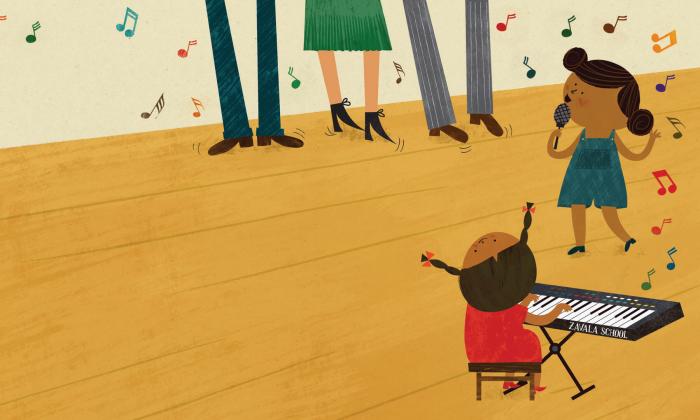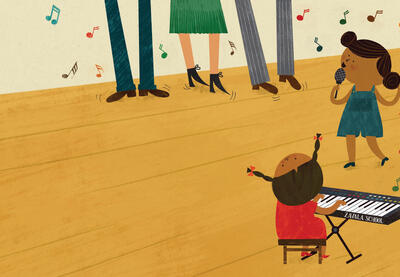Gloria and Rosa sat cross-legged on the floor in Gloria’s room, braiding their dolls’ hair. As usual, Rosa was humming.
“DUM duh, duh DUM duh,” she sang softly. Her head bobbed from side to side as she wove strands of her doll’s hair right-over-middle, then left-over-middle. Back and forth.
“Why do you hum that song?” Gloria asked. She reached for a pale blue ribbon to tie the bottom of a braid, even though stray tufts of hair jutted from her doll’s scalp.
“It helps me keep track,” Rosa answered. “On the duhs, I cross one hank of hair over the middle one. On the DUMs, I pull them tight. Try it.”
“Not me,” Gloria said. “I don’t have a good voice like you do. If I sang, even our dolls would run away!” She made her doll’s legs run toward the door. “It’s a pretty song, though.”
“My abuela taught it to me,” Rosa said. “Her mother taught it to her when she was a little girl in Mexico. It’s called ‘Cielito Lindo.’”
“What does the name mean?” Gloria asked.
“Well, cielito means bit of sky, and lindo is pretty. Together, they mean lovely little one. That’s why I sing it to my doll.”
Rosa held her doll up, its hair sporting sparkly turquoise ribbons.
Gloria said, “Her braids are perfect!”
“Gloria!” her mother called from downstairs. “Your piano teacher’s here.”
“Time for my lesson with Miss Rostov,” Gloria said to Rosa. “See you after school tomorrow?”
“Could I stay and listen?” Rosa begged. “Please?”
“Playing in front of people makes me nervous,” Gloria admitted.
“I’ll be very quiet,” Rosa promised.
Reluctantly, Gloria agreed that Rosa could stay. Sitting behind her friend in the living room, Rosa barely breathed. Even so, Gloria knew that Rosa was listening. She stumbled over the simplest pieces. But Rosa didn’t notice.
“That was beautiful!” she exclaimed.

Every Thursday for the next month, Rosa listened to Gloria’s lessons, even though Gloria kept making mistakes. Finally, Gloria asked Rosa, “Why don’t you take lessons, too?”
“We don’t have a piano,” Rosa answered.
“What about at school?”
“Hernandez doesn’t have a piano, either.”
“It doesn’t? What do you do in music class?” Gloria asked.
“We sing,” Rosa said. “We don’t have any instruments.”
“None?”
Gloria told Rosa about the keyboards, drum sets and recorders at Zavala, the school she attended.
“I wish we had those,” Rosa said. “My teacher says our school can’t afford to buy instruments, but it’s not fair!”
“You’re right,” Gloria agreed. “Hernandez deserves the same things Zavala has.”
“Every school does!”
“That’s true,” Gloria said. “Let’s talk with our music teachers tomorrow and compare notes with each other after school.”
The next afternoon, the girls met at Rosa’s house and discussed what their music teachers had told them.
“My teacher says there’s not much money for our school’s music program,” Rosa said. “The only way we can buy instruments is to raise money, but instruments are very expensive.”
“Hmmm,” Gloria frowned. “Our school’s band booster club helps us get instruments. What if we ask them for suggestions?”
“That’s a good idea,” Rosa agreed. “We should also show them why all the kids in our community should have instruments at school.”
“What do you have in mind?” Gloria asked.
“Well, I’m a good singer, and you’re a wonderful pianist…”
“Oh, no! I can’t do that!” Gloria exclaimed.
“You won’t be alone!” Rosa replied. “We’ll do it together.”
Looking down at her fingers and taking a deep breath, Gloria finally said, “OK. I can do this.”
“We can do this,” Rosa smiled, grabbing her friend’s hand.
We would like to show you how kids in our community can make beautiful music together. But, we can only do it if we all have the same chance.
The next week, Gloria’s mother drove the girls to the booster club meeting.
After all the business on the meeting’s agenda had been covered, the club president said, “I understand some young people would like to speak.”
Rosa stood.
“Yes, sir,” she said. “And sing.” She nudged Gloria, who added, “And play.”
Gloria had borrowed an electronic keyboard from Zavala, and the girls hauled the instrument to the front of the room.
In unison, they stated, “We would like to show you how kids in our community can make beautiful music together.”
“But,” Rosa explained, “we can only do it if we all have the same chance.”
“Some of the schools in our community don’t have any instruments,” Gloria chimed in, “but we hope we can change that.”
On the keyboard, Gloria accompanied Rosa as she sang “Cielito Lindo.”
When the girls finished their performance, the members of the booster club cheered.
As Rosa and Gloria returned to their seats, the club president said, “It’s not right that some of our schools have enough money to buy instruments and others don’t.” He turned to the other members and asked, “Do you think we could help by sharing the money we raise with other schools in the community?”
The club members voted and agreed unanimously.
“It’s a start,” the president said.
Gloria and Rosa said, “Lovely!”
Questions for Readers
Right There (in the text)
What does Gloria’s school have that Rosa’s school does not?
Think and Search (in the text)
What obstacles do Gloria and Rosa face when they try to solve the inequity between their two schools?
Author and Me (in my head)
Why do you think Cynthia Levinson chose the title “Gloria and Rosa Make Beautiful Music”? What is the meaning of this title?
On My Own (in my head)
Have you ever noticed that your school has some things other schools do not, or that other schools have things your school needs? Explain.

